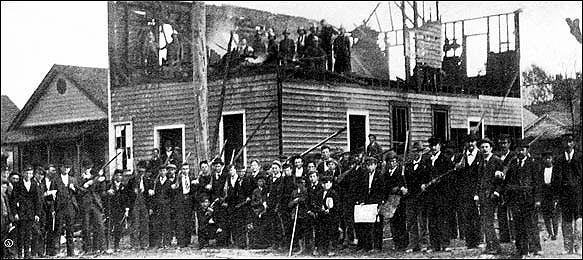 "The Wrecked 'Record' Building and a Group of Vigilantes" Collier's Weekly Magazine, 26 November 1898 |
| Like Charles Chesnutt's The Marrow of Tradition, Hanover, or The Persecution of the Lowly is a novelistic account of what is usually called "the Wilmington, North Carolina, race riot of 1898," though it would be more accurate to call the event the violent overthrow of an elected government by an organized group of white supremacists. After a propaganda campaign that emphasized the danger black enfranchisement posed to white women, on 10 November 1898 hundreds of armed white "vigilantes" took to the streets, burning the office of the city's black newspaper (above), killing between 7 and 20 blacks, and driving scores of others away for good, while replacing the city's integrated Republican government with segregationist Democrats. Most national accounts of the event treated it as a victory for the forces of civilization. Like Chesnutt, Fulton treats it as a moral tragedy. David Bryant Fulton grew up in Wilmington, though he moved to New York City in 1888, before beginning to write under the name of "Jack Thorne." Not enough is known about him, not even how widely any of his many books and pamphlets were read. Hanover is a difficult text to read, though its deliberate mix of documentary and novelistic styles is extremely interesting. As its subtitle clearly suggests, Fulton had Uncle Tom's Cabin, or Life Among the Lowly in mind as he wrote it. In the two excerpts below, different women characters talk explicitly about the value of Stowe's book. In the first, the character is the African American mistress of one of the white leaders of the supremacists; in the second, the reference to Stowe's novel is made by "an old and wealthy white citizen." Both, as Richard Yarborough has noted, emphasize a part of Stowe's story that was often ignored: the story of Cassy, and her sexual exploitation by a series of white men, culminating of course with Simon Legree.* (n.p. [probably New York]: M. C. L. Hill, 1900) |
